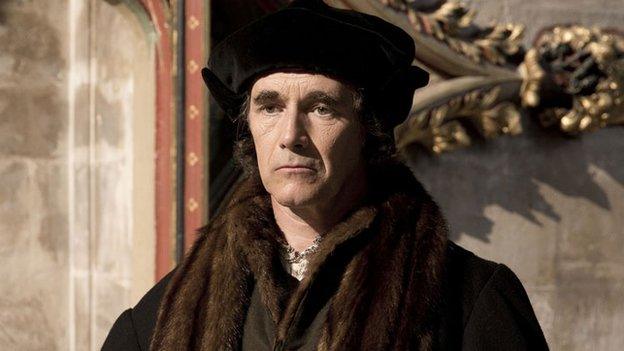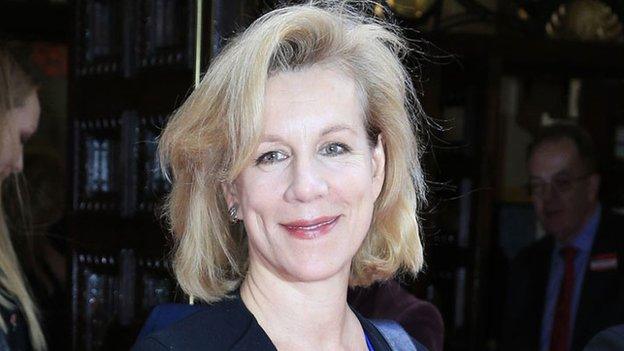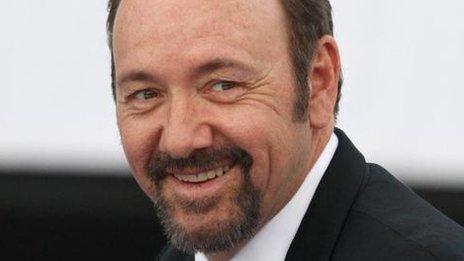Mark Rylance claims that tickets 'cost too much' rejected by subsidised theatres
- Published

Rylance played Thomas Cromwell in the BBC's dramatisation of Hilary Mantel's Wolf Hall
A claim by Mark Rylance that subsidised companies such as the National Theatre and the Royal Shakespeare Company are charging "way too much" for tickets has been rejected by both institutions.
The actor told The Stage, external subsidy should be dependent on lower ticket prices.
The RSC responded by highlighting the range of prices of tickets available for its recent West End transfers.
The National, meanwhile, said it was committed to "keeping as many tickets priced as low as possible".
Speaking at the recent launch of an artists' campaign, external against the Transatlantic Trade and Investment Partnership (TTIP), Wolf Hall star Rylance said subsidised theatre productions "had to be accessible".
"You can't have the RSC and the National receiving millions of pounds of money without a lower price, in my feeling," he went on. "A lower price should be part of it."
His comments were endorsed by actress Juliet Stevenson, who told the newspaper, external that West End ticket prices were so high she could no longer afford to go.

Stevenson was recently seen at the Young Vic in Samuel Beckett's Happy Days
She said she had wanted to see her friend, Dame Harriet Walter, in the RSC's production of Death of a Salesman, but had balked when she discovered it would cost her £285.
"I rang up Harriet and said: 'At the moment... I can't really afford to see your play," she is quoted as saying. "'I have two children and it's going to cost nearly £300.'"
Stevenson also criticised the "completely scandalous" booking fees that are now routinely charged when tickets are purchased for any live event.
'Extraordinarily wide range'
"Mark Rylance and Juliet Stevenson are right to say London ticket prices should be within the reach of everyone," said Catherine Mallyon, the RSC's executive director.
"They are however commenting on top price tickets, and may not be aware of the full range of tickets and discounts available.
"For our recent West End shows, prices range from £10 to £69.50. A family of two adults and two children could buy advance tickets to Death of a Salesman for £40.
"There are audience members who wish to purchase premium tickets however, and this income helps us to offer an extraordinarily wide range of ticket prices."
Once a booking fee and restoration levy is added to the £69.50 price, the top ticket price for Death of a Salesman rises to £71.75.
Stevenson did not specify how many tickets she was attempting to purchase, though £285 would have been the cost of four tickets costing £71.75 each.
In its response to Rylance's comments, the National said it was "committed to sharing our work with as many people as possible".
"We agree with Mark that affordable ticket pricing plays an important role in that, and use our public funding to help achieve that accessibility."
Tickets to its main house shows, its spokesperson continued, ranged from £15 to £55, with no additional booking fees.
The National also receives sponsorship from the Travelex foreign exchange company that enables it to make more than 100,000 £15 tickets available for four of its productions.
- Published14 March 2012
